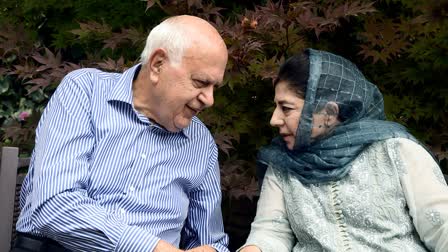Srinagar (Jammu and Kashmir): As the Jammu and Kashmir Assembly elections are being held after a gap of 10 years and as the first elections following the downgrading of the state to a Union Territory, they are being watched closely. Since 1965, Jammu and Kashmir has seen nine politicians, starting from Ghulam Mohammed Sadiq to Mehbooba Mufti, serving as Chief Ministers of the erstwhile state. While the Jammu and Kashmir Union Territory is now voting to elect its first Chief Minister, here is a look at the longest and shortest-serving Chief Ministers of Jammu and Kashmir.
National Conference's president Dr Farooq Abdullah holds the record as the longest-serving Chief Minister. He served three terms, accumulating 11 years and 17 days in total. His first term ran from September 8, 1982, to July 2, 1984, for one year and 298 days. His second term lasted from November 7, 1986, to January 19, 1990, for three years and 73 days, followed by a six-year tenure from October 9, 1996, to October 18, 2002. Sheikh Mohammad Abdullah served a combined total of seven years and 90 days. His first term spanned from February 25, 1975, to March 26, 1977, lasting two years and 29 days, while his second term lasted from July 9, 1977, to September 8, 1982, for an additional five years and 61 days. Ghulam Mohammed Sadiq is the third longest-serving Chief Minister, with a tenure from March 30, 1965, to December 12, 1971, totaling six years and 257 days. Interestingly, Congress's Sadiq was the first CM of Jammu and Kashmir.
Peoples Democratic Party's Mufti Mohammad Sayeed served as Chief Minister for approximately three years and 312 days, with his first term from November 2, 2002, to November 2, 2005, and a second term from March 1, 2015, to January 7, 2016, lasting 312 days. Omar Abdullah served from January 5, 2009, to January 8, 2015, for a total of six years and three days.
In contrast, Awami National Conference's Ghulam Mohammad Shah is recognized as the shortest-serving Chief Minister, with a term from July 2, 1984, to March 6, 1986, totaling one year and 247 days. Last CM of erstwhile state of Jammu and Kashmir Mehbooba Mufti served for two years and 77 days from April 4, 2016, to June 20, 2018.
Since 1965, Jammu and Kashmir has also witnessed multiple interruptions in democratic governance, marked by periods of Governor's Rule and President's Rule. Significant instances of Governor's Rule were enforced from March 26 to July 9, 1977, and from March 6 to September 5, 1986. The state experienced President's Rule during the late 1980s, spanning over six years from July 19, 1990, to October 9, 1996. Since October 30, 2019, Jammu and Kashmir has remained under President's Rule, with no elected Chief Minister following the region's transition to a Union Territory.
State of Jammu and Kashmir (1965–2019)
- Ghulam Mohammed Sadiq (30 March 1965 to 12 December 1971) - 6 years and 257 days in office - Indian National Congress
- Syed Mir Qasim (12 December 1971 to 25 February 1975) - 3 years and 75 days in office - Indian National Congress
- Sheikh Mohammad Abdullah (25 February 1975 to 26 March 1977) - 2 years and 29 days in office - National Conference
- Governor's Rule (26 March 1977 to 9 July 1977) - 105 days
- Sheikh Mohammad Abdullah (9 July 1977 to 8 September 1982) - 5 years and 61 days in office - National Conference
- Dr Farooq Abdullah (8 September 1982 to 2 July 1984) - 1 year and 298 days in office - National Conference
- Ghulam Mohammad Shah (2 July 1984 to 6 March 1986) - 1 year and 247 days in office - Awami National Conference
- Governor's Rule (6 March 1986 to 5 September 1986) - 183 days
- President's Rule (6 September 1986 to 7 November 1986) - 62 days
- Dr Farooq Abdullah (7 November 1986 to 19 January 1990) - 3 years and 73 days in office - National Conference
- Governor's Rule (19 January 1990 to 18 July 1990) - 180 days
- President's Rule (19 July 1990 to 9 October 1996) - 6 years and 82 days
- Dr Farooq Abdullah (9 October 1996 to 18 October 2002) - 6 years and 9 days in office - National Conference
- Governor's Rule (18 October 2002 to 2 November 2002) - 15 days
- Mufti Mohammad Sayeed (2 November 2002 to 2 November 2005) - 3 years in office - Peoples Democratic Party
- Ghulam Nabi Azad (2 November 2005 to 11 July 2008) - 2 years and 252 days in office - Indian National Congress
- Governor's Rule (11 July 2008 to 5 January 2009) - 178 days
- Omar Abdullah (5 January 2009 to 8 January 2015) - 6 years and 3 days in office - National Conference
- Governor's Rule (8 January 2015 to 1 March 2015) - 52 days
- Mufti Mohammad Sayeed (1 March 2015 to 7 January 2016) - 312 days in office - Peoples Democratic Party
- Governor's Rule (7 January 2016 to 4 April 2016) - 52 days
- Mehbooba Mufti (4 April 2016 to 20 June 2018) - 2 years and 77 days in office - Peoples Democratic Party
- Governor's Rule (20 June 2018 to 19 December 2018) - 182 days
- President's Rule (20 December 2018 to 30 October 2019) - 314 days
Union Territory of Jammu and Kashmir (2019–present)
President's Rule (30 October 2019 to till now) - 4 years and counting.
Read more:
- J&K Assembly Polls: Stage Set for Crucial Second Phase
- Nearly Half Of Candidates Contesting J&K Assembly Polls Are Millionaires; 13 Percent Face Serious Criminal Cases: ADR Report
